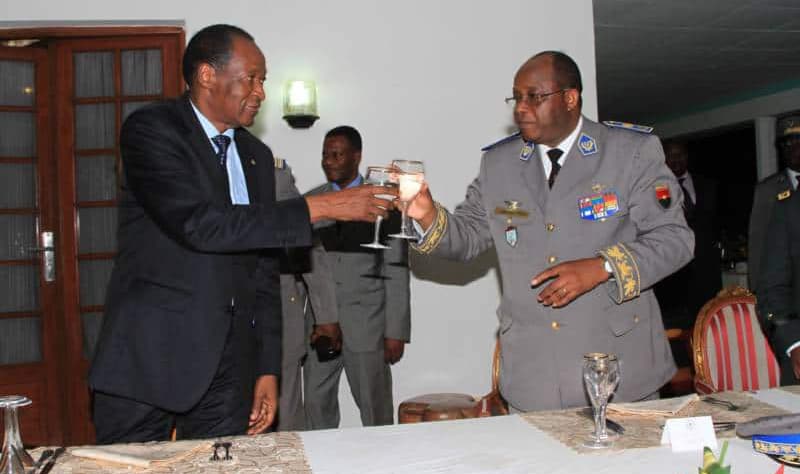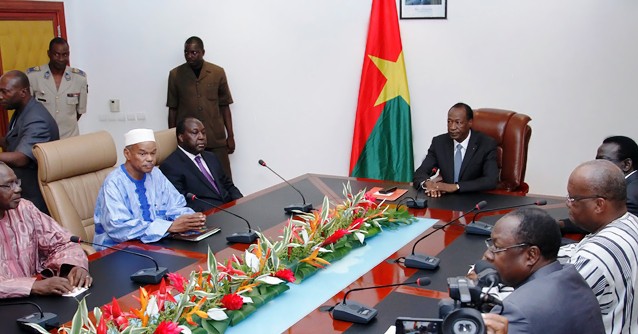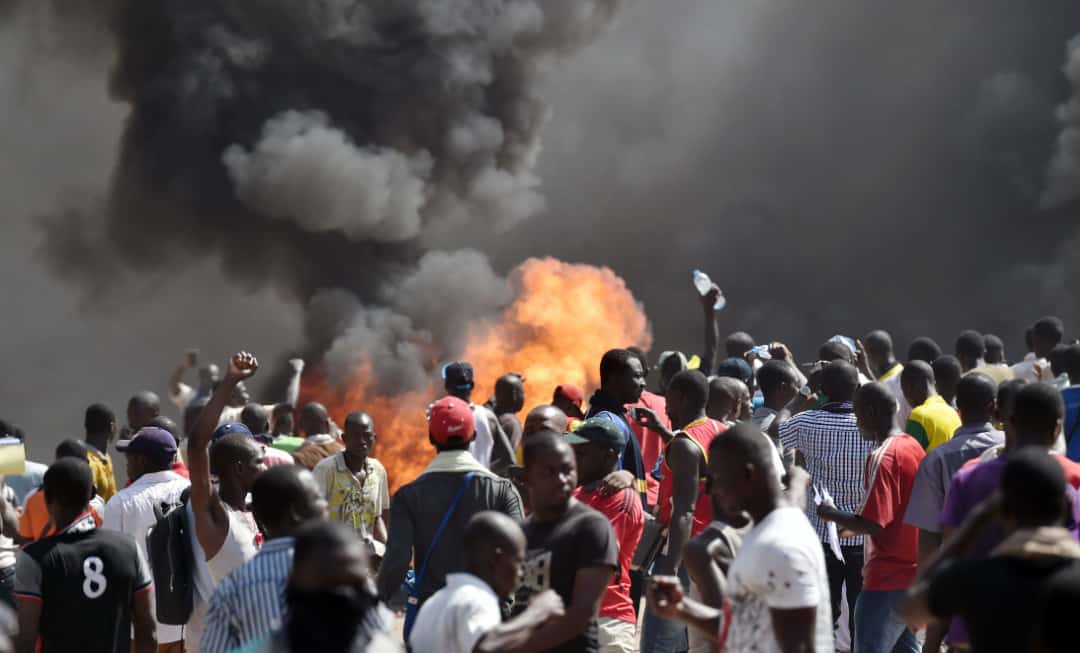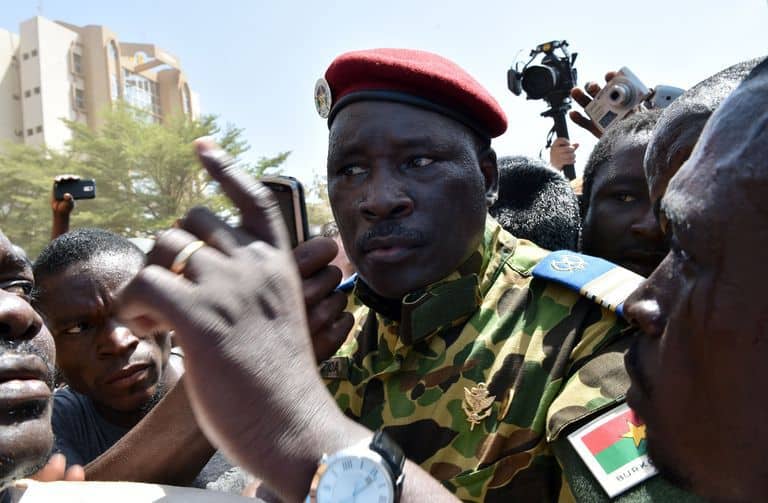The Fall of a Leader
The events that followed each other in rapid succession during the last days of October 2014 in the West African country of Burkina Faso have surprised the entire world and most of all the Burkinabè themselves (399).
The one who was one of Africa’s most influential men during three decades, according to the French daily Le Monde, (400), resigns on October 31, 2014 following a popular revolution against a democratically elected leader, a military coup by his army chief of staff Honoré Traoré who the same evening is forfeited by lieutenant-colonel Isaac Zida (401).
Revising the Constitution, legal but not possible?
President Blaise Compaoré originally came to power in 1987(402), and has governed the country ever since, having been subsequently confirmed in office by the electorate in increasingly open polls: Freedom House (403).
A term limit under a constitution adopted in 2000 prevented the incumbent head of state from running again in the presidential election scheduled for November 2015 (404).
Amendment of article 37, limiting office to 2 terms of 5 years each, is legally allowed by Burkina’s Constitution. Following 164 of the Constitution, an amendment is possible on issues of national interest either by referendum or by ¾ of the total votes at the National Assembly. That implies that at least 96 out of the 127 deputies have to vote favorable for amendment of the Constitution (405).
In fact, the African Union Charter on Democracy, Elections and Good Governance has stipulations firmly restricting this practice but authorizes modifications, including having recourse to a referendum according to article 10.2 stipulating that:
“State parties shall ensure that the process of amendment or revision of their constitution reposes on national consensus obtained if need be, through referendum (406)”
African Union Charter
Important demonstrations took place on July 7, 2013 in Ouagadougou and Bobo Dioulasso, the country’s second largest city, calling for the amendment of the Constitution in order to permit President Compaoré to participate in the 2015 elections.
Compaoré has never hidden his view that Burkina still needed a strong man with political instability in neighbouring countries and terrorism threats on the rise in the Sahel region (407) before handing over to a new generation of women and men with experience in politics.
On December 12, 2013, the day after the National Independence celebration in Dori, North of Burkina- during a press conference, President Compaoré announced his intention to hold a referendum should the political class be unable to arrive at a decision regarding article 37 of Burkina’s Constitution (408).
He wanted to pave the way for a new and younger generation of political leaders to succeed him. He wanted to skip the political establishment, all made up by former ministers of Compaoré, thus opening up a real new era after him. He needed one more term.
The schism between Compaoré and the caciques of the ruling party
As a consequence, 2 months later, on January 5, 2014, the caciques of the ruling party, Roch Kaboré, then President of the National Assembly during 10 years and often seen as Compaoré’s successor, Salif Diallo his former almighty Minister of Agriculture and “his lieutenant for over 20 years” and Simon Compaoré, Ouagadougou’s mayor during 17 years, left the party, creating a new one, the Movement of the People for Progress (MPP) (409).
Several declarations from government officials during 2014 lead to the assumption that the constitution might be subject to revision by referendum. In Ouagadougou on June 21st 2014, a massive pro referendum gathering was held in a full football stadium with a capacity crowd of 35,000 (410).
The Council of sages recommends a 2-years transition period
In order to preserve harmony and mutual understanding among Burkina’s citizens, a merit Blaise Compaoré’s is renowned for and not only by his admirers but also by his adversaries, a Council of sages, was convened, following African tradition, to facilitate dialogue and consensus-building among the political class, influential figures and civil society on this matter of national interest; the modification -or not- of article 37 of the Constitution (411).
The Council of sages in charge of the consultation was composed by a wide range of independent and respected figures and headed by former Head of State and Doctor-Commander Jean-Baptiste Ouédraogo (412). Taking into account the boycott of the consultation process by the opposition, and after having heard all the other stakeholders, the Council of sages finally recommended a smooth political transition of 2 years in order to maintain the nation’s stability and to preserve its institutions as well as its economic growth.
The conclusions of the Council of sages being rejected by a part of the political class, president Compaoré met with all its leaders, assigning them the task to come to a consensus in order to ensure a democratic transition (413). The dialogue failed due to lack of political will of certain political opposition leaders (414).
Burning down the National Assembly
On October 21, 2014, the government announced its intention to submit a bill to the National Assembly to amend Article 37 of the Constitution. Indeed, the third strongest political party, the Alliance for Democracy and Federation/African Democracy Rally (ADF/RDA), had agreed to support the bill (41). With this support, Compaoré could count on 99 votes: 70 from the ruling Congress for Democracy and Progress (CDP), 18 from ADF/RDA, and 11 from the Convention of Republican Forces (CFR) (416). If voting instructions were to be followed by the deputies of these parties and parliamentary groupings, the bill would have received more than 96 votes, which is the ¾ majority needed to adopt the bill without having to call for a referendum (417).
Following the announcement to submit the polemic bill, protests were reported in Ouagadougou on October 21 and 22, 2014. Skirmishes and clashes intensified on October 27 in Ouagadougou and Bobo-Dioulasso, the second largest city, between the security forces and opponents to the constitutional amendment. Zéphirin Diabré (UPC), the leader of the opposition, called for a march on October 28 (418).
None of the protest marches have been forbidden, interdicted or impeded by the authorities. All manifestations were authorized by the government, who did not order to suppress the protests. This is quite unique on the continent and in the world and it honors the democratic values of Burkina’s authorities. Some even consider that, ironically, President Compaoré’s fall resulted partly from his open and tolerant policies to ensure the advent of free and critical press, including social media and a dynamic civil society. He achieved his goal; Burkina Faso became known for its rich debates but steadily they got more and more fueled by the frustrations of the urban youth of which there is a population explosion.(419).
Since the ruling Congress for Democracy and Progress did not have the super-majority required to pass a constitutional amendment on its own, on October 30 at the National Assembly the debate was expected to be vigorous and accompanied by what was, undoubtedly, a large amount of political horse-trading before final passage (420). Deliberations, let alone a parliamentary vote, never got underway. On October 30, day of submitting the controversial bill, protesters who had turned into mobs entered the National Assembly putting it on fire while deputies fled for their lives. Many government buildings, shops and private homes fell victim to this sudden storm of violent protests (421).
Tensions were so high that by Thursday, even Prime Minister Luc-Adolphe Tiao’s announcement that the amendment was being withdrawn was not enough to mollify the assembled mobs, which set about ransacking the offices of the national broadcasting corporation (RTB) and then burning down the city hall and several other public buildings (422).
“Things are out of control because the demonstrators do not listen to anyone”
Alassane Ouedrago, opposition parliamentarian
Shortly after, roving bands of youths began attacking the private residences of politicians (423), like the one of CDP’s executive secretary Dr. Assimi Kouanda, a historien of Islam and close to Compaoré, whose poor horses were burned alive. His important collection of Islamic manuscripts from the Sahel region was also lost forever in flames. One opposition parliamentarian, Alassane Ouedrago, lamented to the Associated Press that “Things are out of control because the demonstrators do not listen to anyone ( 424).” Outbreaks of violence also erupted elsewhere in Burkina Faso, including Bobo-Dioulasso, the country’s second-largest city, where numerous shops and other businesses were pillaged (425).
In less than 48 hours, 14 public buildings and 260 private livings were looted and destroyed by acts of arson. The chaos that hence followed and the flames set by arson caused the death of 19 persons (426).
By Thursday evening October 30, 2014, notwithstanding the proclamation of a national state of emergency by the president, the violence continued. Demonstrators moved towards the presidential palace Kosyam, scanting Compaoré to leave. The president received three of them in his office, amidst them Hervé Ouattara, leader of the anti-referendum coalition. They asked his immediate resignation. Compaoré told them that he would not do so under such conditions. He has responsibilities; he is the president and has to organize the aftermath of the events in order to avoid chaos. They left unsatisfied (427).
Finally, the Army Chief of Staff, Major General Honoré Traoré, stepped forward declaring both the National Assembly and the government dissolved, imposing a curfew on the entire territory from 7 pm to 6 am, and promising the formation of an inclusive government to organize elections in twelve months’ time (428).
After several hours of confusion about whether the president would have a role in this transition or even whether he was still in the country—wild rumors flashed repeatedly across social media and news stories described a “coup (429)”— Blaise Compaoré appeared to give an address on national television to confirm the dissolution of the government, announced the lifting of the state of siege, and reported that he would open discussions with the political opposition and civil society in order to form a Government of national union in charge of organizing free and transparent elections.
The president also announced the amendment project had been withdrawn and that at the end of the transition period, which he would lead, he would “transfer power to his successor (430).” The US State Department praised the move (431). Despite the calls for calm, there were still some protests on Friday October 31, 2014 as demonstrators called for the president’s immediate ouster (432). Bénéwendé Sankara, an opposition tenor said that the president’s immediate departure is a non-negotiable condition (433). Looting amplified, spreading out over different areas of the country. The protesters, rioters and the opposition politicians who used social media to urge more mass protests prevailed. At midday President Compaoré announced by official communiqué his resignation “In order to safeguard our democratic evolution and socio-economic progress.” He declared “the presidency vacant in order to enable the establishment of a transition.” Compoaré specified that :
“The transition should lead to free and transparent elections within a span of maximum 90 days as the Constitution stipulates (434)”
Alas, the carefully constructed compromise on October 30, was not enough for some opposition politicians, who used social media to mobilize crowds to fill the burned out streets of the capital of Ouagadougou on Friday 31st. Facing the prospect of even greater violence, Compaoré did the right for his country and resigned (435), exhorting the Burkinabè People in his address to the Nation to “ remain cautious and united in order to safeguard democracy in Burkina and to safeguard future generations from this crisis (REF- 46).”
“They wanted me to leave, so I left. If the country will be better, and that’s all I care about, they were right. History will tell”
Blaise Compaoré, Nov. 2014
Seizure of power by the military
His resignation was immediately followed by an unconstitutional seizure of power by the military ( 436). Firstly, by the army chief of staff, major general Honoré Traoré, (437). But the latter was the same evening replaced by lieutenant-colonel Isaac Zida who in turn auto-proclaimed himself head of state of the transition (438). He added during an interview broadcasted by RFI that “ general Traoré’s declarations were irrelevant ( 439).” Within the span of less than 24 hours, between Friday 31 and Saturday the first, Burkina Faso knew 3 presidents (440).
On November 3, 2014, the African Union (AU) adopted a comprehensive response to the crisis calling for a “civilian-led and consensual transition.”
“The African Union deplores the declaration of the military through which it suspended the Constitution and assumed power as constituting a coup d’état (441)”
African Union, Nov.11. 2014
Compaoré’s role as a mediator in several conflicts in the region, has made his country an important regional and international partner in resolving crises in West Africa (442). Considered as one of the rare stable countries in a region that remains troubled by security, political and health crises, Burkina Faso now in turn felt over (443).
Compaoré in an interview on October 3, 2014 with reporters from the African weekly Jeune Afrique said about his resignation « they wanted me to leave, so I left. If the country will be better, and that’s all I care about, they were right. History will tell. (444).”



